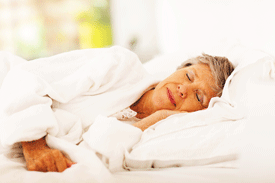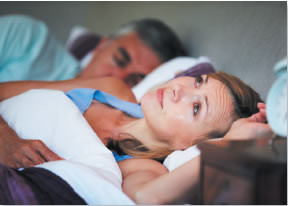
What can magnesium do for you and how much do you need?

Dry socket: Preventing and treating a painful condition that can occur after tooth extraction

What happens during sleep �� and how to improve it

How is metastatic prostate cancer detected and treated in men over 70?

Could biofeedback help your migraines?

Plantar warts: Options for treating this common foot condition

Cancer survivorship: What comes next after treatment

Nutritional yeast: Does this savory, vegan seasoning pack a nutritional punch?

Salmonella is sneaky: Watch out

Two jobs may lower the odds of dying from Alzheimer's disease �� but why?
Sleep Archive
Articles
The effects of sleep deprivation on surgeons �� and their patients
Do the long hours in the hospital, often with little sleep, make doctors in training more prone to making mistakes? Over the past decade, concerns regarding trainee doctors’ sleep loss and the potential for medical errors have brought about limits on the number of consecutive hours a resident can work in the hospital. Do the same concerns apply to fully licensed surgeons? A recent study in The New England Journal of Medicine suggests that the answer is no. Comparing the data on patients whose surgeons were on call the night before with that of patients whose surgeons were not working the night before showed virtually no difference in how well the patients did after surgery. It is not clear, however, whether these doctors anticipated the effects of being on call and compensated for them, or whether these results would be the same for less-experienced surgeons-in-training.
Melatonin for jet lag
Ask the doctor
Q. My wife and I are planning a trip to Europe and we are dreading the jet lag, which hits both of us hard. Is there any evidence that melatonin really helps? Are there any prescription drugs we could ask our doctor about?
A. Jet lag refers to fatigue or a disturbed sleep pattern after travel across multiple time zones. Some small studies have suggested that melatonin is helpful for jet lag if taken a few days before and after travel. Melatonin is a natural substance released by our brain to help with our circadian (day/night) rhythm. This rhythm is disturbed with travel across three or more time zones.
Does breathing through my mouth affect my dental health?
Ask the doctor
Q. I find that I breathe through my mouth at night because my nose seems to stuff up once my head is on the pillow. Does sleeping with my mouth open affect my teeth and gums?
A. Open-mouth breathing can dry out your gums and the tissue lining your mouth, leading to a change in the natural bacteria, which can promote gum disease and tooth decay. Lying flat can cause mucus to accumulate in your nose. Try propping up your head with a firmer pillow—or a couple of pillows. If that doesn't work, you should talk to your doctor about your problem. You may have an allergy or polyps obstructing your nasal passages that can make it difficult to breathe through your nose and may need to see an otolaryngologist (an ear, nose, and throat specialist). Meanwhile, be sure to brush and floss your teeth regularly and drink lots of water to moisten your mouth throughout the day.
Too little �� or too much �� sleep linked to dementia risk
Participants in the Women's Health Initiative Memory Study (WHIMS) have provided a trove of information. They completed monthly questionnaires and underwent cognitive tests. Those who showed significant decline were also tested for dementia.
Recently, researchers analyzed data from 7,444 participants over 65. They had followed the women an average of seven years. Their report was published online June 15, 2015, by Alzheimer's & Dementia.
Restructure your day to get a better night's sleep
Consistency in your schedule may help restore patterns of sleep and waking so you can get needed rest.
Image: Thinkstock
Wake up at the same time every day. Waking time is the anchor for your circadian sleep rhythm.
The free time that accompanies your older years may allow you to keep any schedule you like: sleep late one day or wake up early the next. But that lack of structure can have a negative impact on your sleep. “I see a fair number of people who say their sleep was better when they were working, but after retirement it becomes more disrupted,�� says sleep specialist Dr. Cynthia Dorsey, assistant professor of psychology in Harvard Medical School’s psychiatry department.
Snoring solutions
Simple changes can help to turn down the volume.
If your wife or sleep partner often seems bleary-eyed and resentful in the morning, you may be one of the millions of adults who snore habitually—a condition that affects twice as many men as women. Snoring occurs when your upper airways narrow too much, causing turbulent airflow. This, in turn, makes the surrounding tissues vibrate, producing noise.
"Snoring is a sign that there is a really narrowed space," says Dr. Sanjay Patel, a sleep disorder specialist at Harvard-affiliated Beth Israel Deaconess Medical Center. "That happens either in your nasal passages or in the back of your throat." Some men are snorers because they have excess throat and nasal tissue. Others have floppy tissue that's more likely to vibrate. The tongue can also get in the way of smooth breathing.
A pill-free way to fight insomnia
It appears that cognitive behavior therapy may help people with chronic insomnia and no underlying medical problems fall asleep faster.
Insomnia therapy helps reduce knee pain
Painful knees and sleeplessness often go hand in hand, but a form of counseling called cognitive behavioral therapy (CBT) can help with both problems, according to a study in Arthritis and Rheumatology.
The study involved 100 people ages 50 to 70 with wear-and-tear arthritis (osteoarthritis) in the knee as well as insomnia. They were chosen at random for either eight sessions of CBT or a comparison treatment, called desensitization therapy, known not to be very effective for insomnia.
How a sleep shortfall can stress your heart
Getting less than six hours of sleep on a regular basis can boost levels of stress hormones, which can strain your cardiovascular system. |
Find out if your sleeping habits put you at risk—and what to do about it.
Treating sleep apnea may stave off cognitive decline
Heavy snoring and sleep apnea may be linked to early declines in memory and thinking, according to a new study published online April 15, 2015, by the journal Neurology. The research also suggests that treating sleep apnea with a continuous positive airway pressure (CPAP) machine may delay the declines.
For the study, researchers reviewed the medical histories for 2,470 people ages 55 to 90 and categorized them as free of memory and thinking problems, in early stages of mild cognitive impairment, or with Alzheimer's disease. For each category, the researchers compared people without sleep apnea, people with untreated sleep apnea, and people with sleep apnea who had used CPAP machines to aid breathing as they slept.

What can magnesium do for you and how much do you need?

Dry socket: Preventing and treating a painful condition that can occur after tooth extraction

What happens during sleep �� and how to improve it

How is metastatic prostate cancer detected and treated in men over 70?

Could biofeedback help your migraines?

Plantar warts: Options for treating this common foot condition

Cancer survivorship: What comes next after treatment

Nutritional yeast: Does this savory, vegan seasoning pack a nutritional punch?

Salmonella is sneaky: Watch out

Two jobs may lower the odds of dying from Alzheimer's disease �� but why?
Free Healthbeat Signup
Get the latest in health news delivered to your inbox!
Sign Up









